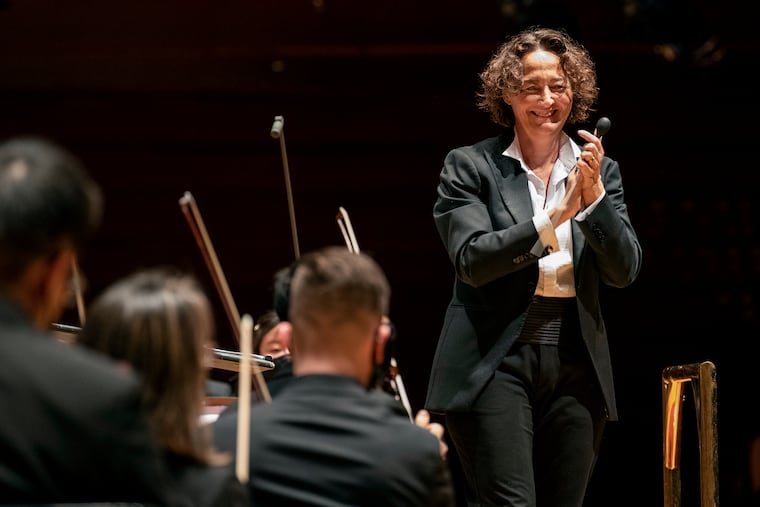In principal guest conductor debut, Nathalie Stutzmann moves into the front ranks of Philadelphia Orchestra regulars
The formidable conductor should be of interest to anyone who cares about the future of the orchestra.

Orchestras are in perpetual music director-search mode. At least the smart ones are. It’s the reality given the fact that conductors might be booked far in advance, relationships take multiple visits to develop, and career arcs take unpredictable twists and turns.
No one has signaled that Yannick Nézet-Séguin is ready to move on from Philadelphia. In fact, the orchestra’s identity continues to be absorbed into that of its main conductor.
But by coincidence this week, two events aligned that should remind the orchestra’s leadership that it’s always good to be looking. The Philadelphia Orchestra announced that Nézet-Séguin, in need of a break, was canceling his Dec. 31 and Jan. 2 dates here. The Metropolitan Opera also sent out word that he was pulling out of concerts there, clearing a nearly four-week stretch on his conducting calendar to “reenergize.”
This is not the first time the 46-year-old conductor has canceled appearances, citing sapped energy or health problems. Can he really continue to lead two major companies, each with urgent needs in trying times?
This week also brought Nathalie Stutzmann’s long-planned first concert wearing the new title of principal guest conductor. Her initial concert in the run, Thursday night in Verizon Hall, was stunning, and you couldn’t help interpret it as something of a rescue. This ensemble once had a deep bench — ongoing relationships with great conductors like Vladimir Jurowski, Simon Rattle, and others. The orchestra hopes to bring them both back in future seasons, an orchestra spokesperson said. But we’ve not seen them in years — since 2016 — and aside from Fabio Luisi, it’s hard to think of other regular visitors of music director timber. Is Stutzmann one?
Orchestra concertmaster David Kim marked the occasion by telling Thursday’s audience of the orchestra’s chemistry with Stutzmann. Chemistry there may be. But what this concert showed about Stutzmann is actually something far less mysterious: She has terrific ideas.
She brought great clarity to music by a living composer. Missy Mazzoli’s Sinfonia (for Orbiting Spheres) has a lot going on in it — the constant hurdy-gurdy drone and fly-by bursts of light as the piece suggests the shape of the solar system. Stutzmann had an ear for balance, bringing out important ideas and carefully tending unusual instrumental combinations (and instruments, such as harmonica and synthesizer). The piece, from 2014, seems to have a bright future, but it seemed to me it might never receive a more sympathetic and vivid interpretation.
If the main canvas of the evening was chosen to play to Stutzmann’s strengths, it was chosen wisely. Mostly known early on as a top contralto, Stutzmann found lieder-like qualities in Schubert’s Symphony No. 9, the “Great,” that I can’t recall any other conductor picking up on. She phased in the contrasting sections of the first movement as if introducing a series of characters — the way Schubert sometimes does in his songs, assigning a specific register and color to the singer as she slips on different roles. Here were characters exuberant, noble, or operating on the edge of menace.
One had the feeling that Stutzmann had worked out a lot in rehearsal. Many details, like the length of notes and an abiding interest in the overall textural clarity of the ensemble, received a great deal of attention. In-the-moment tingles, though, are also in her personality, and she spent those energies judiciously. That gathering gust of speed early in the movement was quite a thrill.
Stutzmann also understood an aspect of Schubert apparent in lieder (as well as in a few piano pieces): the impact of a devastating nervous breakdown. The second movement started with an important difference, more strident than merely sad, which made the awful-wonderful climax all the more intense. There was something forward-looking in scaling these emotions to a higher pitch, something maybe that made you understand where Mahler would come from. The second two movements didn’t provide the same degree of insight, but that had more to do with the music itself than the interpretation. The conductor did deploy a sense of flex-tempo that made for some delightful, meaningful phrasing.
Stutzmann appeared with the Philadelphians several times before being made principal guest and her current deal keeps her here for three years. She was recently named the next music director of the Atlanta Symphony Orchestra. Whatever her official affiliations, she’s the kind of formidable artistic mind that anyone who cares about the future of this orchestra will want on the premises more often.
Additional performance: Saturday at 8 p.m. in Verizon Hall, Broad and Spruce Streets. Tickets are $10-$169. philorch.org, 215-893-1999.